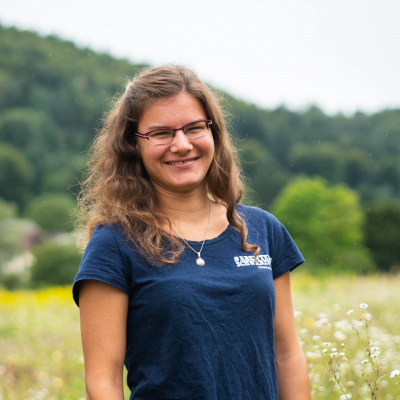- Graduate School GLOMAR
- PhD student members
- Selma Mezger
Selma Mezger
| Institution: | University of Bremen |
| Office: | UFT, room 2150 |
| Phone: | +49 421 218 - 63485 |
| E-mail: | [Bitte aktivieren Sie Javascript] |
| Other webpage(s): | Selma's working group web page |

PhD Project
The combined effects of global and local factors on non-calcifying shallow-water benthic organisms currently replacing calcifiers
In my PhD I focus on deciphering the effects of different global and local factors in combination on non-calcifying organisms, such as soft corals and macroalgae, which are currently replacing hard corals all over the world.
The growing amount of global and local anthropogenic factors on coral reefs worldwide drives
ecological changes with an array of different global consequences. Studies show that these factors often result in substantial non-random community changes, also termed phase shifts. This is due to the decline in coral cover, loss of diversity in coral reefs, and general reef degradation. Phase shifts are often defined as an abrupt community change occurring when an ecological tipping point has been reached. In this scenario increasing stressors drive an ecological change resulting in a functionally different stable system. Studies show that most reefs will undergo such structural and functional changes as a response to global and local factors and often these changes go towards a macroalgae or soft coral dominated state. Yet, despite the new research is showing evidence for alternative communities, our knowledge about the reasons for their success as well as their new functional role remains scarce.
Thus, my PhD project aims to make a first step in better understanding the combined effects of global and local factors on the functioning of coral reefs including associated benthic taxa, with special emphasis on soft corals and macroalgae. To accomplish this goal, a series of manipulation experiments in the laboratory and in-situ are planned to assess the reaction of these organisms towards a range of combined global and local factors in comparison to hard corals. Especially closing the knowledge gap about the interactions of global and local factors is crucial to improve our understanding of their combined effects, to anticipate expected shifts in community composition and to see how these non-calcifying organisms may shape biogeochemical processes in coral reefs.
Thesis Committee
| Prof. Dr. Christian Wild | University of Bremen |
| Dr. Yusuf El-Khaled | King Abdullah University of Science and Technology (KAUST), Saudi Arabia |
| Dr. Susana Carvalho | King Abdullah University of Science and Technology (KAUST), Saudi Arabia |


